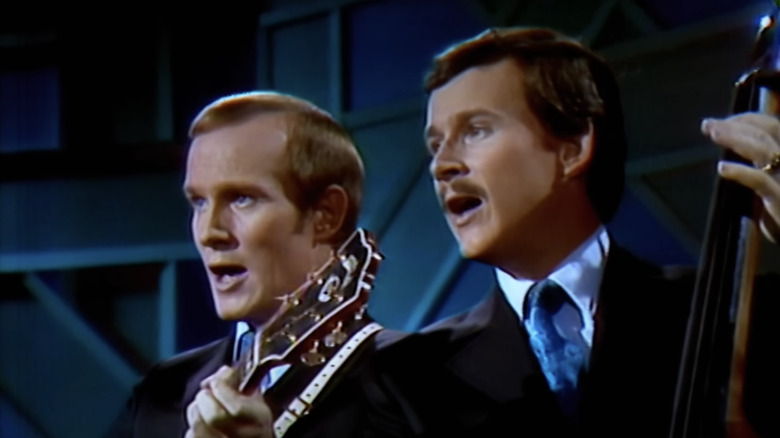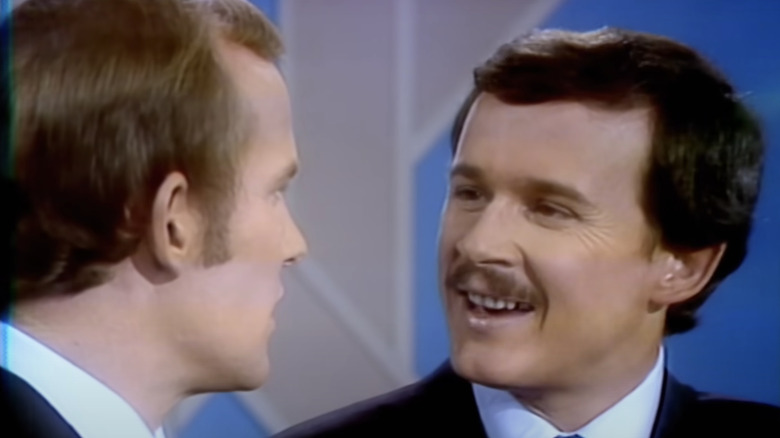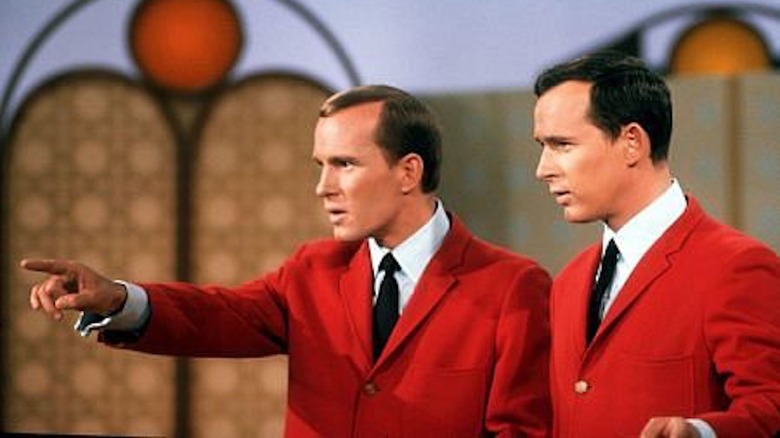How The Smothers Brothers Comedy Hour Made An Enemy Out Of CBS
Eight years before "Saturday Night Live" started stirring up trouble for NBC, "The Smothers Brothers Comedy Hour" was the counterculture bane of CBS' programming existence. And unlike the surprisingly game gang at 30 Rockefeller Center, the suits at the Eye (that's the nickname for CBS' logo) could not be mollified by high ratings.
The enmity between CBS and Smothers was forged by a perfect confluence of time and content. When the variety show premiered on February 5, 1967, the United States was waging two very different wars on two geographically inconvenient fronts. The country had just entered its second year of full-on, boots-on-the-ground combat in Vietnam, and though a slim majority still supported the conflict, the nation's youth weren't keen on getting drafted to fight an enemy that didn't pose an immediate physical threat to America. This unease dovetailed with the unrest at home: anti-war protests, the ongoing Civil Rights Movement, and a general sense of societal derailment four years after the assassination of President John F. Kennedy was shoveling black powder into a keg that would finally blow in the summer of 1968.
And perhaps most troubling for CBS, "The Smothers Brothers Comedy Hour" aired in prime time.
Tom and Dick Smothers were in their late 20s when their show debuted. They'd honed their craft in San Francisco's culturally progressive comedy scene, and were thus attuned to the roiling counterculture sentiment. They knew what turned their audience on, and, once CBS realized this, they couldn't turn them off fast enough.
They felt we were invading their territory
The trouble started almost instantly, and, according to a Hollywood Reporter piece timed to the show's 50th anniversary, it originated with CBS News. "They felt we were invading their territory," said writer-producer Saul Ilson. "The Smothers Brothers Comedy Hour" was despised by conservative, churchgoing Americans, and earned them a spot on Richard Nixon's enemies list.
The Smothers and their young writing staff (which included Steve Martin, Albert Brooks, Bob Einstein, Don Novello, and the recently-interviewed-by-/Film Rob Reiner) were unbowed. They irreverently lampooned an establishment that wasn't used to more than collegial ribbing, and made a mockery of the country's democratic system by running comedian Pat Paulsen for president. If you watch the series today, it all comes off as incredibly tame, but it was uncouth stuff at the time.
And then there were the musical guests. If you look through the list, you'd expect the trouble to come from upstarts like The Who and The Doors, but aside from the former's infamous pyrotechnic accident, the major dust-ups were caused by folk singer Pete Seeger (whose "Waist Deep in the Big Muddy" got deep-sixed from the broadcast for too closely allegorizing the Vietnam War) and Harry Belafonte (who performed "Lord, Don't Stop the Carnival" as a criticism of the 1968 Democratic National Convention in Chicago).
It was all way more than CBS bargained for, and, finally, the Smothers pushed the network too far.
One generation's edgy is another's banal
CBS might've loathed "The Smothers Brothers Comedy Hour," but it was so popular during its third season in 1969 that the network had no choice but to pick it up. Still, CBS honcho William S. Paley had tired of the Smothers' unceasing disobedience, so he used their flouting of the network's standards and practices as an excuse to yank the show off the air on April 4, 1969. It was a rage quit, one that wound up costing CBS just south of $800,000 when the Smothers successfully sued the network for breach of contract.
The Smothers Brothers remained a comedy institution for decades to come, but they never came close to regaining their cultural relevance – largely because they'd blazed too wide a trail. Two years after they booted "The Smothers Brothers Comedy Hour" off the air, CBS greenlit Norman Lear's working-class satire "All in the Family," which revolved around Carroll O'Connor's unrepentantly bigoted Archie Bunker. A few years later, they brought Lear's "The Jeffersons" to the airwaves, which featured Sherman Hemsley firing off the n-word. Did viewers complain? Absolutely. But at their peak popularity, the shows routinely finished in the Nielsen ratings' top ten. Also, there was a distance. Lear was slyly advocating a point of view, whereas the Smothers and their guests were less diplomatic.
When CBS revived "The Smothers Brothers Comedy Hour" in 1988, many of the writers and performers returned, but they couldn't match the bite of a thriving "Saturday Night Live." Before the network killed the show for a second time, it was mostly a showcase for Tommy Smothers' yo-yo tricks. Better to burn out, and burn bridges, than fade away.


